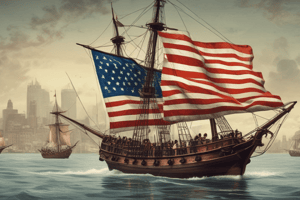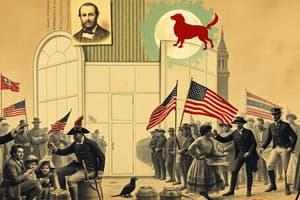Podcast
Questions and Answers
What marked the beginning of the Revolutionary War?
What marked the beginning of the Revolutionary War?
- The battle of Bunker Hill
- The battles of Lexington and Concord (correct)
- The Boston Tea Party
- The signing of the Declaration of Independence
What does the term 'reliability' refer to in the context of evaluating sources?
What does the term 'reliability' refer to in the context of evaluating sources?
- The persuasiveness of an argument
- The explanation for evidence supporting a claim
- How accurate or trustworthy a source is (correct)
- The author's personal beliefs and values
Why was the battle of Bunker Hill considered a moral victory for Americans?
Why was the battle of Bunker Hill considered a moral victory for Americans?
- They were able to stand firm against the British despite limited ammunition (correct)
- They received support from foreign allies
- They captured a significant number of British troops
- They won the battle and gained control of Boston
What is meant by an 'unalienable' right?
What is meant by an 'unalienable' right?
Which of the following terms describes the author's argument or position on an issue?
Which of the following terms describes the author's argument or position on an issue?
Who authored the Declaration of Independence?
Who authored the Declaration of Independence?
How did John Adams view the actions taken during the Boston Tea Party?
How did John Adams view the actions taken during the Boston Tea Party?
What is meant by 'corroboration' in the context of analyzing historical sources?
What is meant by 'corroboration' in the context of analyzing historical sources?
Where do governments derive their power according to the Declaration of Independence?
Where do governments derive their power according to the Declaration of Independence?
What does 'create a new system' mean in the context of political change?
What does 'create a new system' mean in the context of political change?
What is an example of 'reasoning' in historical argumentation?
What is an example of 'reasoning' in historical argumentation?
Which term best describes a government where decision-making is concentrated in the hands of a few?
Which term best describes a government where decision-making is concentrated in the hands of a few?
Which statement best represents the word 'credibility'?
Which statement best represents the word 'credibility'?
What consequence did the Boston Tea Party have on the colonies?
What consequence did the Boston Tea Party have on the colonies?
What does the term 'common good' refer to?
What does the term 'common good' refer to?
Why might the perspective of the Boston Gazette differ from that of John Adams?
Why might the perspective of the Boston Gazette differ from that of John Adams?
What should be done if a government abuses its power?
What should be done if a government abuses its power?
What was a major weakness of the Americans during the Revolutionary War?
What was a major weakness of the Americans during the Revolutionary War?
Which strength did the British forces possess during the Revolutionary War?
Which strength did the British forces possess during the Revolutionary War?
What was the significance of the Battle of Saratoga?
What was the significance of the Battle of Saratoga?
What was the outcome of the Battle of Bunker Hill for the Americans?
What was the outcome of the Battle of Bunker Hill for the Americans?
Under the Articles of Confederation, who held more power?
Under the Articles of Confederation, who held more power?
Which of the following was a weakness of the British during the American Revolution?
Which of the following was a weakness of the British during the American Revolution?
What significant event did the victories at Trenton and Princeton lead to?
What significant event did the victories at Trenton and Princeton lead to?
Flashcards
Reliability
Reliability
How trustworthy or accurate a source of information is.
Credibility
Credibility
How convincing an argument is based on its evidence and reasoning.
Corroboration
Corroboration
Comparing different sources to see where they agree and disagree.
Point of View
Point of View
Signup and view all the flashcards
Claim
Claim
Signup and view all the flashcards
Reasoning
Reasoning
Signup and view all the flashcards
What was John Adams' point of view about the Boston Tea Party?
What was John Adams' point of view about the Boston Tea Party?
Signup and view all the flashcards
What information is corroborated by both sources?
What information is corroborated by both sources?
Signup and view all the flashcards
Political system
Political system
Signup and view all the flashcards
Democratic
Democratic
Signup and view all the flashcards
Authoritarian
Authoritarian
Signup and view all the flashcards
Common good
Common good
Signup and view all the flashcards
Inside the system
Inside the system
Signup and view all the flashcards
Outside the system
Outside the system
Signup and view all the flashcards
Create a new system
Create a new system
Signup and view all the flashcards
Declaration of Independence purpose
Declaration of Independence purpose
Signup and view all the flashcards
What should be done if a government abuses its power?
What should be done if a government abuses its power?
Signup and view all the flashcards
Significance of Bunker Hill
Significance of Bunker Hill
Signup and view all the flashcards
Significance of Saratoga
Significance of Saratoga
Signup and view all the flashcards
Significance of Yorktown
Significance of Yorktown
Signup and view all the flashcards
Who has more power under the Articles of Confederation?
Who has more power under the Articles of Confederation?
Signup and view all the flashcards
What was one purpose of government under the Articles?
What was one purpose of government under the Articles?
Signup and view all the flashcards
What was another purpose of government under the Articles?
What was another purpose of government under the Articles?
Signup and view all the flashcards
How effective was the Confederation Congress under the Articles?
How effective was the Confederation Congress under the Articles?
Signup and view all the flashcards
Study Notes
Revolutionary War Study Guide
-
Source Evaluation: A reliable source is accurate and trustworthy. Evaluating persuasiveness involves examining agreement and disagreement among sources. Understanding author attitudes, opinions, beliefs, arguments is crucial in evaluating the source. The reasoning behind a claim must also be examined.
-
Boston Tea Party (Source 1): John Adams' diary entry from December 17, 1773, expresses support for independence from Britain. He describes the Boston Tea Party as a "magnificent Movement" and praises the "Dignity" of the Patriots' actions that day.
-
Boston Tea Party (Source 2): The Boston Gazette, December 20, 1773, describes the colonists' actions as a critical effort to protect East India Company property. The colonists emptied tea into the Boston Harbor, and the report emphasized the lack of damage to ships or other property. The colonists expressed their happiness and praise for each other's actions.
-
John Adams' Perspective: John Adams viewed the Boston Tea Party as a momentous, admirable event, highlighting its significant impact.
-
Political Systems:
-
Political System: The overall structure of how a country's government functions.
-
Common Good: What is best for most people.
-
Democratic: A system of government where the people are involved in decision-making.
-
Authoritarian: A system where a few people or one person hold all the power.
-
Inside/Outside the System: Methods of creating change that are or are not permitted by the existing laws.
-
Historical Knowledge:
-
Lexington and Concord: Marked the beginning of the American Revolutionary War.
-
Bunker Hill: A moral victory for the Americans despite their eventual retreat (lack of ammunition), demonstrating their ability to withstand British forces.
-
Declaration of Independence:
-
Purpose: To declare American independence from Britain.
-
Author: Thomas Jefferson
-
Unalienable Rights: Life, liberty, and the pursuit of happiness (the rights that all men are born with, and cannot be taken away).
-
Government Power: Comes from the consent of the governed.
-
Government abuses: The people should address the problems, and in the most severe cases, replace the government.
-
Strengths and Weaknesses of the American Forces:
-
Strengths: Knew the land, strong reason for fighting.
-
Weaknesses: Insufficient supplies, a weaker army & navy, less experienced soldiers.
-
Strengths and Weaknesses of the British Forces:
-
Strengths: Stronger army, superior navy, more money, longer military service terms.
-
Weaknesses: Did not know the land, no strong reason to fight, and less motivation for their engagement in the conflict.
-
Significant Battles in the American Revolution:
-
Bunker Hill: Demonstrated American resolve to fight against the British.
-
Trenton/Princeton: Continental Army gained troops and morale.
-
Saratoga: Convinced France to join the American cause.
-
Yorktown: Final major battle that led to the end of the war and American victory.
-
Articles of Confederation: A document outlining the laws and rules of the new federal government established after the revolution.
-
Power Distribution: The states retained significant power, and the national government had limited authority.
-
Effectiveness: Ineffective in many ways; struggled in handling issues like unifying the newly formed nation.
Studying That Suits You
Use AI to generate personalized quizzes and flashcards to suit your learning preferences.




